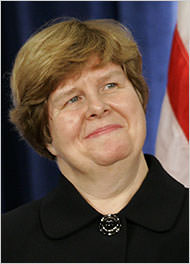she means the recovery interval '33 to '37 of course
not the real full recovery triggred by the arsenal of democracy post sept '39
"What I showed in the paper was that there was a very aggressive monetary response – not only going off the gold standard, as Temin and Wigmore discuss, but following up with a big monetary expansion."
okay
the Temin expectational move was going off gold ie liberating the monetary base
" It was probably the one time in US history when we had a monetary expansion that was orchestrated by the executive branch rather than by the Federal Reserve."
no we had one from 43-51 as well
" In the mid-1930s a lot of gold was flowing to the US because of political tensions in Europe. Because we were back on the gold standard (but at a lower price for the dollar), the Treasury Department had the ability to turn the gold inflow into increases in the money supply."
okay now it was a devaluation not going off gold and an exogeneous safe haven flow
combining to allow easier credit
here called expanding the money supply
as if that were accomplished by a simple switch throw
as in
" As a result, the money supply grew rapidly after 1934."
but that today hasn't led to aggressive spending just ballooning real cash balances
" You can think of this as a very early version of quantitative easing – which economists describe as increasing the money supply even when interest rates are already at zero."
but chrissy what did the executive branch do

"I showed that this monetary expansion affected real interest rates by ending expectations of deflation."
note we're talking expectations of future real interest rates here
" In the data, interest-sensitive spending – such as business investment and consumer purchases of durable goods – responds to this fall in real interest rates. Interest-sensitive spending was a major engine leading us out of the Great Depression."
chrissy is relying on the same formal errr ..."mechanism" ..no mentalism
as the austerian expansionists ..no ?
the austerians argue fiscal budget tightening moves lead to lower expected or anticipated reral rates
ala bondage bobbly rubin
--though bondage boy was talking lower real because of lower nominal
where as chrissy is talking lower real because of higher inflation
i hate to say this but
maybe here is the rub
if we look at the re value of the existing debt jacket
there's a difference here
existing bonds in bobby R's regime change go up in nominal and real value
but
down in nominal and real value in chrissy's regime change
revaluation of the existing bond stock or devaluation ??
part of the recovery is lifting the burden of existing debt
"My study was one of the earlier papers to talk about whether monetary policy can be useful at the zero lower bound."
" I argued that absolutely it could be. "
"I think the Great Depression provides the best evidence we have that more aggressive monetary policy can help us to recover faster, even in a world of very low nominal interest rates"
wjhat are CR's parallels in todays driving
for devaluation
in particular
removing the pledge to stay as good as gold
and an nra policy of lifting prices ie administered inflation